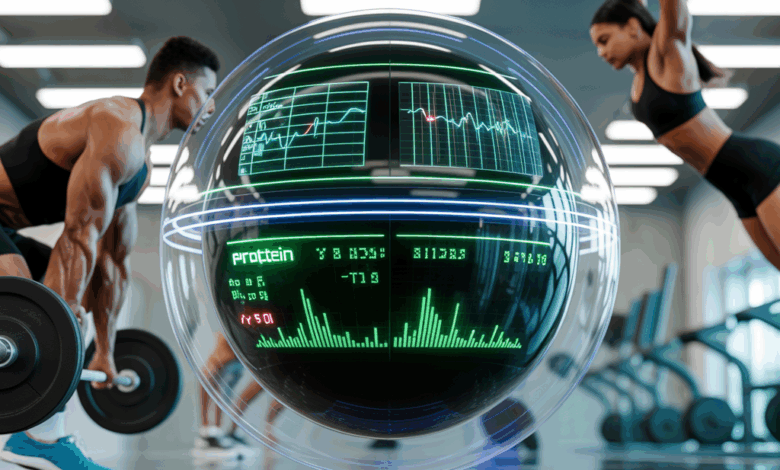Protein Calculator for Athletes: How Much Protein Do You Really Need?

Ever finished a workout and wondered, “Am I eating enough protein to support my gains?” Or maybe you’ve heard conflicting advice about how much protein an athlete really needs. If you’ve ever felt overwhelmed trying to calculate your ideal protein intake, you’re not alone. The good news? A protein calculator for athletes can simplify this process and help you tailor your nutrition perfectly to your training goals.
Why Protein Matters for Athletes
Protein is the cornerstone of muscle repair and growth. Whether you’re a runner, weightlifter, or a weekend warrior, your body relies on adequate protein to recover from intense workouts and build strength. But it’s not just about consuming more—it’s about consuming the right amount based on your unique body size, activity level, and sport.
The Role of Protein in Athletic Performance
- Muscle Repair: Protein provides amino acids essential for repairing muscles after microtears from exercise.
- Energy Source: During prolonged exercise, protein can provide an alternative energy source once carbs are depleted.
- Immune Support: Adequate protein helps maintain a strong immune system to prevent illness that can derail training.
What Is a Protein Calculator for Athletes?
A protein calculator for athletes is a tool designed to estimate how much protein you should eat daily to maximize training benefits. It typically considers factors like your:
- Body weight
- Training intensity and duration
- Sport or physical activity type
- Fitness goals (muscle gain, maintenance, fat loss)
By inputting these details, the calculator generates personalized protein intake recommendations that align with your athletic needs—no guesswork necessary!
How to Use a Protein Calculator for Athletes Effectively
While calculators simplify protein math, here are key tips to get the most accurate results:
1. Know Your Weight and Lean Body Mass
Many calculators ask for your body weight, but if possible, use your lean body mass for a more precise estimate since fat tissue requires less protein than muscle.
2. Be Honest About Your Activity Level
Input your real training intensity and frequency. An endurance runner may require different protein than a powerlifter, even if their weights are similar.
3. Set Clear Fitness Goals
Are you bulking up for muscle gain, maintaining your current physique, or trying to lose fat while preserving muscle? Choose the appropriate goal as this influence protein needs.
Recommended Protein Intake Ranges for Athletes
General guidelines for protein intake vary, often measured in grams per kilogram (g/kg) of body weight:
- Recreational athletes: 1.0 – 1.2 g/kg
- Endurance athletes: 1.2 – 1.4 g/kg
- Strength athletes & powerlifters: 1.6 – 2.2 g/kg
- During fat loss phases (muscle preservation): 2.0 – 2.4 g/kg
Note: These are starting points; your personal protein needs can vary based on metabolism, workout demands, and recovery rate.
Real-World Example: Using a Protein Calculator
Meet Sarah, a 65kg amateur triathlete training 6 days a week. She wants to optimize recovery and maintain lean muscle mass while improving endurance. Plugging her stats into a protein calculator gives her a daily target of around 1.4g/kg protein, or roughly 91 grams per day. She plans meals around lean protein sources like chicken, fish, legumes, and dairy—spaced evenly throughout the day.
Protein Sources That Fuel Athletic Success
Not all proteins are created equal. To maximize nutrient absorption and muscle synthesis, athletes should aim for a combination of:
- Complete proteins: Foods containing all essential amino acids such as eggs, dairy, lean meats, fish, and soy.
- Plant-based proteins: Beans, lentils, quinoa, chickpeas, and nuts, combined strategically to provide comprehensive amino acid profiles.
- Protein supplements: Whey, casein, or plant-based powders can be convenient for busy athletes needing a quick post-workout boost.
Smart Workout Variations to Maximize Protein Utilization
Pair your protein intake with training styles that promote muscle synthesis and recovery:
- Resistance training: Incorporate compound lifts like squats, deadlifts, and bench presses for overall strength.
- Interval training: High-intensity interval training (HIIT) helps improve endurance and metabolic rate.
- Active recovery sessions: Low-intensity movement on rest days supports blood flow and muscle repair.
Healthy Lifestyle Advice to Complement Your Protein Intake
Protein works best when combined with a well-rounded lifestyle. Consider these tips:
- Stay hydrated to support nutrient transport and joint health.
- Get 7-9 hours of quality sleep to optimize muscle repair and hormone balance.
- Manage stress through mindfulness or yoga, as stress can hinder muscle recovery.
- Balance your macronutrients – don’t neglect healthy fats and carbohydrates needed for energy and hormone function.
Frequently Asked Questions
Protein calculators provide an informed estimate based on scientific guidelines and your input but aren’t 100% precise. Use them as a guide and adjust based on how your body responds.
While rare, excessive protein intake may strain kidneys or dehydrate you. Stick within recommended ranges and spread protein evenly throughout meals to optimize absorption.
Consuming protein within 30-60 minutes post-workout supports muscle repair. However, evenly spaced protein intake across the day is more important for sustained muscle growth.
Conclusion: Take Control With a Protein Calculator for Athletes
Your protein needs as an athlete aren’t one-size-fits-all, but with the help of a protein calculator for athletes, you can tailor your nutrition to meet your unique demands. Combine this knowledge with smart workout routines and a balanced lifestyle to unlock your full athletic potential.
Ready to optimize your performance and recovery? Try calculating your protein intake today and check out our nutrition guides and workout routines for even more support on your fitness journey.





